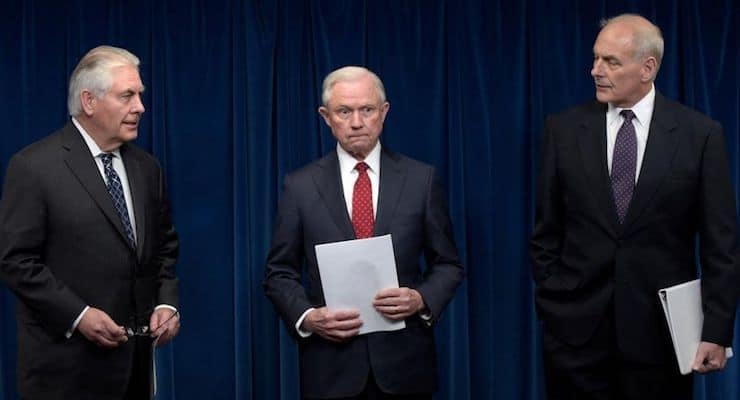

Secretary of State Rex Tillerson, left, Attorney General Jeff Sessions, center, and Secretary of the Department of Homeland Security (DHS) John Kelly, right, hold a press conference to announce a new executive order travel ban signed by President Donald J. Trump.
A federal judge in Hawaii has completely disregarded the law and granted a temporary halt to President Donald J. Trump’s revised travel ban. U.S. District Judge Derrick Watson was nominated to the federal bench by President Barack Obama and is the only Native Hawaiian judge serving on the federal bench, as well as the fourth in U.S. history.
His ruling, which is based on the Establishment Clause, meaning he agreed it was a faith-based ban, came less than two hours after the hearing ended. The judge conceded he couldn’t stay within the letter of the law because it was Donald Trump who signed the executive order.
Despite the “Muslim ban” claim, the order itself makes no mention of religion and does not give preference to Christian refugees persecuted in the six Muslim-majority nations identified as hotbeds of Islamic terrorism, as the first order was intending. Further, roughly 90% of the world’s Muslim population is not impacted by the rewritten order.
“It doesn’t say anything about religion. It doesn’t draw any religious distinctions,” said Jeffrey Wall, who argued for the Justice Department.
Democrat Attorney General Doug Chin argued the “the new executive order is resulting in the establishment of religion in the State of Hawaii contrary to its state Constitution.”
The filing also argued the revised ban will damage Hawaii’s “economy, educational institutions, and tourism industry; and it is subjecting a portion of the state’s citizens to second-class treatment and discrimination, while denying all Hawaii residents the benefits of an inclusive and pluralistic society.”
But even liberal constitution scholars aren’t buying this argument.
“I frankly don’t see how that can be sustained,” liberal law professor Jonathan Turley said. “I don’t see the case law supporting that in the long run.”
Anticipating a wave of lawsuits expected to follow over the constitutionality of the proposal, the Trump Administration and White House counsel addressed all the concerns of the liberal activist courts that previously granted opposition a temporary stay on the initial order signed by President Trump, which was rescinded.
The “Executive Order Protecting The Nation From Foreign Terrorist Entry Into The United States” specifically cites the president’s authority to suspend refugee entries for 120 days granted by the U.S. Constitution and the U.S. Congress, the latter being the Immigration and Nationality Act (INA).
Whenever the President finds that the entry of any aliens or of any class of aliens into the United States would be detrimental to the interests of the United States, he may by proclamation, and for such period as he shall deem necessary, suspend the entry of all aliens or any class of aliens as immigrants or nonimmigrants, or impose on the entry of aliens any restrictions he may deem to be appropriate.
However, unlike the first order, it also details categories of people eligible to enter the United States for business or medical travel purposes, no longer suspends Syrian refugee admissions indefinitely and excludes Iraq. Still, lawyers for the state of Hawaii, the most liberal state in the country, said immediately they would move for a temporary restraining order a day before the new executive order is supposed to take effect.
The new order also excludes green card holders, but still applies to travelers from Iran, Libya, Somalia, Sudan, Syria and Yemen who did not obtain a visa before Jan. 27 from entering the United States for 90 days. For countries impacted by the order, there is a 50-day window to comply with requests to improve the “quality” of the information provided to U.S. officials for the purpose of vetting.
Worth noting, the order also provides a process by which impacted travelers can apply for exemption, meaning the judge halted the order before anyone could even be considered legally harmed. On the president’s burden, all he needs to prove is a rational basis for issuing the order, which the Department of Homeland Security gave him a week before the new executive order was revised.
DHS revealed nearly a third of the 1,000 domestic terrorism cases currently being investigated by the Federal Bureau of Investigation (FBI) involve those admitted to the U.S. as refugees.
Officials said some of those 300 came to “infiltrate” the U.S., while others were radicalized once they were in the country.
In 2015, FBI Director James Comey said the Bureau was investigating roughly 900 terror probes including every U.S. state. But the report represents the first official solid tie between the refugee resettlement program and an increase in terrorism.
“If that becomes the new normal, that would be hard to keep up,” ” Director Comey said.
Pundit’s Perspective
We don’t really care whether or not a judge agrees with an executive order or not. Lawless judiciaries are a threat to the very foundation of self-governance. While some of us might even think this particular order is a waste of time, while others fully support it, it concerns us that the will of the people and the president’s lawful authority can be thwarted without legal justification.
Why does it concern us?
Because it’s only a matter of time before the sovereign begins to wonder why they still obey the law when others do not. We all don’t have to be well-read on Thomas Jefferson to ask ourselves a simply question: If voting, the sole course of action to affect change in a self-governing society is no longer effective, then what other recourse is there?







